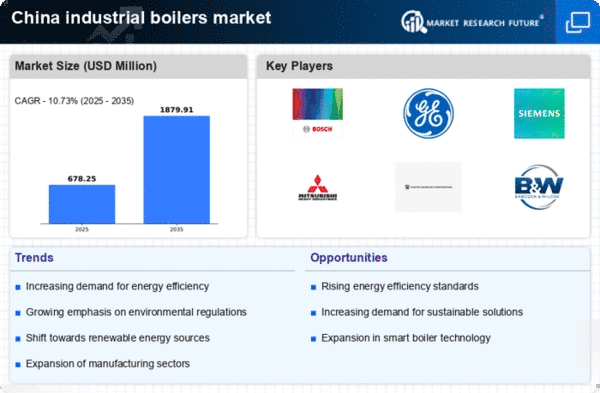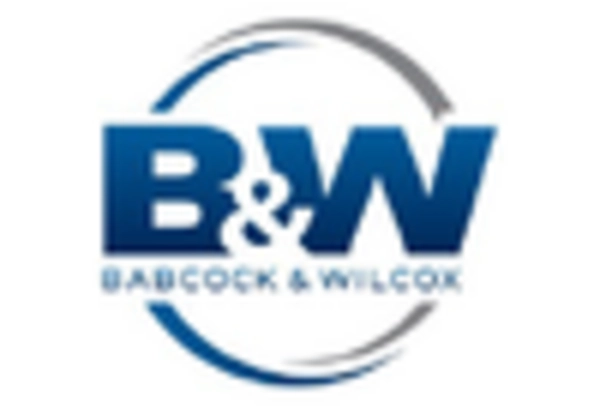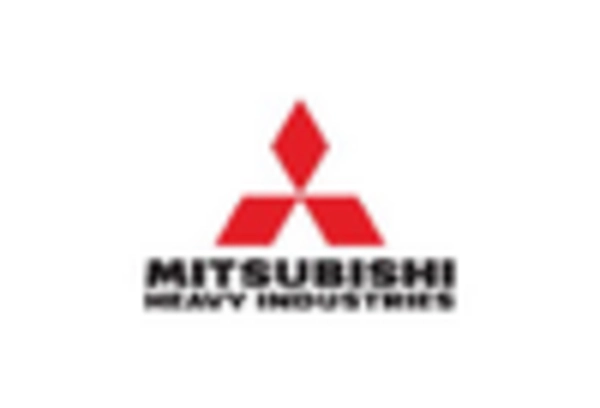Rising Energy Costs
The rising energy costs in China are compelling industries to seek more efficient heating solutions. With energy prices fluctuating, companies are increasingly focused on reducing operational expenses. The adoption of high-efficiency boilers can lead to energy savings of 15-30%, making them a financially viable option for many businesses. This trend is particularly evident in energy-intensive sectors such as manufacturing and food processing, where the cost of energy directly impacts profitability. As a result, the industrial boilers market is likely to see increased demand as companies prioritize cost-effective and energy-efficient solutions.
Focus on Renewable Energy Sources
The growing focus on renewable energy sources is reshaping the industrial boilers market in China. As the country aims to diversify its energy mix, there is a notable shift towards integrating biomass and other renewable fuels into boiler systems. This transition is supported by government incentives and policies promoting sustainable energy practices. The industrial boilers market is expected to witness a growth rate of around 7% as industries adopt these renewable solutions. This shift not only aligns with environmental goals but also enhances energy security, making it a crucial driver for the future of the industrial boilers market.
Industrial Growth and Urbanization
China's rapid industrial growth and urbanization are pivotal factors influencing the industrial boilers market. As urban areas expand, the demand for energy and heating solutions increases significantly. The industrial sector, particularly manufacturing and construction, is projected to grow at a rate of 5% annually, necessitating the installation of efficient boiler systems. This growth is further fueled by the government's initiatives to boost infrastructure development, which creates a robust demand for industrial boilers. Consequently, the industrial boilers market is likely to benefit from this urban expansion, as industries seek reliable and efficient heating solutions to support their operations.
Regulatory Compliance and Standards
The industrial boilers market in China is experiencing a surge in demand due to stringent regulatory compliance and standards imposed by the government. These regulations aim to reduce emissions and enhance energy efficiency, compelling industries to upgrade their boiler systems. The Chinese government has set ambitious targets for reducing carbon emissions, which has led to a projected growth rate of approximately 6% in the industrial boilers market. Companies are increasingly investing in advanced technologies to meet these standards, thereby driving the market forward. The emphasis on compliance not only ensures environmental sustainability but also enhances operational efficiency, making it a critical driver in the industrial boilers market.
Technological Advancements in Boiler Design
Technological advancements in boiler design are transforming the industrial boilers market in China. Innovations such as modular boiler systems and enhanced combustion technologies are improving efficiency and reducing operational costs. The introduction of smart monitoring systems allows for real-time performance tracking, which can lead to energy savings of up to 20%. As industries strive for greater efficiency, these advancements are becoming increasingly attractive. The integration of cutting-edge technology not only enhances the performance of boilers but also aligns with the growing emphasis on sustainability, making it a significant driver in the industrial boilers market.
















